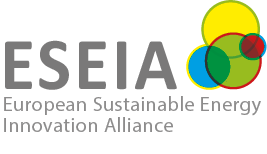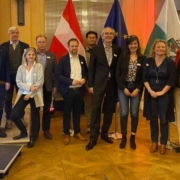ESEIA Lecture Series: Third Lecture Explores the Intersection of Art, Technology and Inclusiveness
The third lecture in the ESEIA Lecture Series on Sustainable Energy Innovation Systems for Climate Neutrality was successfully held on 27 April 2023. Over 30 attendees from 7 countries joined us in person in Graz and online to explore the topic of New European Bauhaus and its core values.
Titled New European Bauhaus for Climate Neutral Cities: Novel ways of engaging with urban and natural heritage, the lecture took place at the Auditorium (Aula) of Graz University of Technology (TU Graz) from 19:00 to 21:00 CET. This lecture is part of the series organised by ESEIA in cooperation with TU Graz to tackle the challenges of achieving climate neutrality by 2050.
The session started with the opening remarks by the ESEIA Director Brigitte Hasewend, who welcomed the participants and reminded the concept behind the hybrid lecture series: dialogue for change. “It is very important to have a place to discuss different positions when we are pressed to realise this transformation to become climate-neutral in Europe,” she noted.
Then, the Head of the Institute of Architecture and Media at TU Graz Urs Hirschberg, who chaired the event, introduced the topic and the panel of speakers:
- Gintaras Stauskis, Professor at the Department of Urban Design of VILNIUS TECH, who provided an overview of the design for sustainability approach and explained how the New European Bauhaus connects the Green Deal to our daily lives;
- Aglaee Degros, Head of the Institute of Urbanism at TU Graz, who shed light on territorial transition and new concepts in architecture and urban design;
- Thomas Drage, Climate Protection Officer of the City of Graz, who explained the transition towards sustainability in Graz, Austria.
During his lecture, Professor Gintaras Stauskis highlighted the importance of placing sustainability at the core of process design and considering the entire life cycle of buildings, especially when these become obsolete.
Moreover, he explained the concept of design for sustainability and its dimensions. “Design for sustainability touches on aspects beyond the aspirations and goals we imagined when doing a building, architecture or urban design project,” he said.
One of the dimensions is product innovation which refers to the process of redesigning existing products and giving them novel ways of use. He used Tetra Pak as an example, explaining how the food processing and packaging solutions company is giving used cartons a new life by turning them into classroom furniture for schools in India.
Professor Gintaras Stauskis also pointed out that design for sustainability is crucial for the environment and, more importantly, our daily lives as it helps to protect nature, create livable cities, fight poverty, create an ethical economy, and avoid discrimination, among others, leaving the audience with much to consider as we strive towards a more sustainable and inclusive future.
After Professor Gintaras Stauskis’s lecture, Aglaee Degros delivered an insightful talk on territorial transition, highlighting the current challenge for the spatial discipline: to move from a speculated territory to an inhabited one. “If we want to achieve the goal of New European Bauhaus, that is the shift we have to make. For me, it is not a sum of small things; it is the system and the mindset we have to change,” she said. She also pointed out that to succeed in territorial transition, it is important to take into consideration emissions reductions and adaptation to climate change in urban regions.
Then, Thomas Drage invited the audience to join him on an imagination tour, envisioning a desirable future with less traffic congestion, pollution and noise, more public green spaces, a plant-based diet, and energy generated within the city limits and explained how the City of Graz plans to achieve the climate goals by 2030 through an action plan that includes 400 measures and aims to inspire different stakeholders to adopt climate-friendly behaviour.
We closed the session with the presentation of Green Divan – a “tree substitute” that can be placed where no trees can be planted – by Sanela Pansinger – adasca e.U. and questions from attendees.
Thank you to the speakers, the participants, the chair Urs Hirschberg, the co-host TU Graz, and all those involved in making this event a success. We look forward to seeing you again soon!
Upcoming lecture: Circular Bio-Based Systems
The fourth lecture in this series will be delivered on 25 May 2023 by the ESEIA Working Group Biorefineries, Biobased Economy and Bioresource Utilization Coordinator Michael Bongards and will focus on the circular economy. During the lecture, titled Circular Bio-Based Systems: metabolon From Theory to Practice, our guest lecturer will provide an overview of novel green technologies and the challenges linked to their integration into society.
The Director of Waste Management of the City of Graz Alexandra Loidl and the CEO of the Umbrella Organisation of Styrian Waste Management Associations Christian Schreyer will join the discussion and share their professional insights highlighting solutions from the point of view of the City of Graz and the Region of Styria, Austria.
The Professor at the Institute of Process and Particle Engineering at TU Graz Michael Narodoslawsky chairs the lecture.
The lecture is free and open to all interested stakeholders. Register here to attend!
More information about ESEIA Lecture Series on Sustainable Energy Innovation Systems for Climate Neutrality is available here.
Contact:
ESEIA Team: office@eseia.eu


